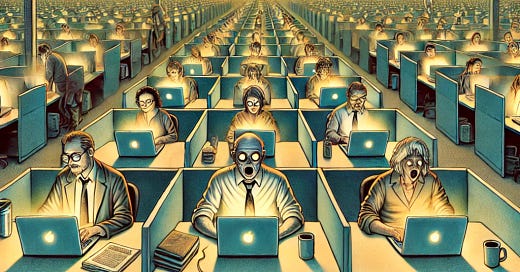What Everyone Gets Wrong about the Bible, Work, and Doordash
You Weren't Supposed to Have Sunday Scaries
Happy Sunday!
The Bible calls this the day of rest, so I’ve been reflecting on what that really means. For some reason this topic is very interesting to me today.
Sunday Scaries as a CEO
A lot of you sent me the post about the HubSpot CEO mentioning she works Sundays to avoid the “Sunday Scaries.” Instead, she takes Friday and Saturday off.
I understand how this can be seen as negative. Most employees don’t have that kind of schedule flexibility. Autonomy over your time isn’t really normalized in most jobs. And employers don’t benefit from employees having more autonomy, so there’s no incentive to make that the standard.
As a CEO who was working a low-level corporate job just two years ago, here’s how my relationship to work has shifted:
Taking too much time off actually makes it harder for me to get back into a creative flow (whether that’s filming, writing my book, or doing Substack posts).
So, I rarely fully unplug from content. I definitely slow down. This year I haven’t been posting daily videos like I used to. But for two straight years, I did exactly that to grow my platforms.
Now, I try to stay in creative flow as long as possible. If I take too much time off, I forget what I’m interested in. I forget what my content means to me. And honestly? I just love being creative. It rarely feels like “work.”
I usually create seven days a week in multi-month sprints. I’ve gotten really good at recognizing when I’m burnt out. It takes practice. My sign is when I start getting irrationally bitter at the entire world.
A lot of comedians talk about taking intentional breaks to live life because you can’t make good jokes if you’re not out living. I really relate to that. As a creative, I can’t offer perspective on work if all I’m doing is working.
That said, when it comes to operational tasks (emails, project management, meetings) I do have clear boundaries in the traditional sense. I keep a schedule that resembles a “normal” 9–5 week.
But I block out meeting-free days as often as I can. I can’t handle a corporate-level meeting load anymore. It burns me out too quickly. I push most meetings to email instead.
What Everyone Gets Wrong About the Bible’s Version of Work
I was thinking about the meaning of that religious significance and reflecting on our culture’s current relationship with work.
Six days you shall labor and do all your work… (Exodus 20:8–10)
This verse doesn’t mean you should sell your soul to a laptop farm, grinding out 10-hour days just to grow a corporation’s profits.
When the Bible says “labor,” it’s referring to all forms of meaningful work: raising kids, managing your home, taking care of finances, yardwork, volunteering, serving your community.
But modern work culture has stretched the definition of “labor” to mean one thing: being productive for someone else’s bottom line. We’re so overworked that we no longer have time for the other kinds of labor that make life rich and grounded.
And because of that, other corporations now sell us solutions for the things we no longer have time to do ourselves: childcare, cleaning, home-cooked meals, etc. The very labor that once gave us pride and purpose is now outsourced.
We’re told to give all our energy to one kind of labor (corporate labor) and buy back the rest. No need to take time off from work to cook dinner when there’s DoorDash.
No wonder we hate work. We’ve been stripped of everything else that used to make life feel whole.
Sunday Scaries and the Sabbath
It’s wild how much our relationship to Sundays has shifted in the postmodern era of laptop-farm work.
We’ve stripped away the essence of what “work” used to mean. And in its place, we’ve created an entire cultural phenomenon: the Sunday Scaries.
We also do this weird thing now where we split our lives into two buckets “work” and “life”. As if they’re totally separate. It’s so detached and fragmented.
No wonder shows like Severance resonate so deeply. It’s all about dissociating your personal identity from your work identity just to survive.




